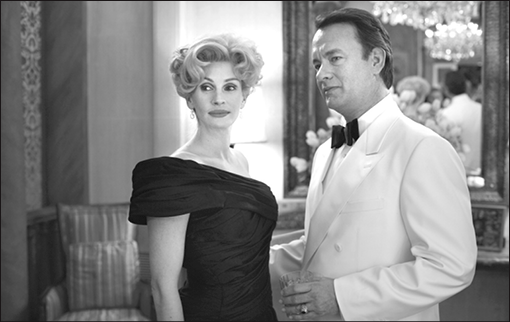By Steven Snyder
“Charlie Wilson’s War”
Written by Aaron Sorkin
Directed by Mike Nichols
Opens Dec. 21
With this sharp a screenplay and this brilliant a cast, “Charlie Wilson’s War” would be an entertaining diversion in any season. But it’s the way director Mike Nichols (“Closer”) infuses the comedy with a hint of tragedy, slicing through the movie’s whimsical tone with a formidable array of serious consequences, that makes this Tom Hanks-Julia Roberts vehicle a fascinating, competitive Oscar contender.
It’s quite the juggling act, skipping with ease between a light-hearted comedy, a historical war study and an all-too-serious commentary on the modern age of terrorism. For some, this is just going to be too much, shifting tone and temperament often several times within the same scene. But for others, it will be the cathartic antidote to the ultra-violent “Sweeny Todd,” or the topical twist to the 19th century-bound “There Will Be Blood” — a wild card of a December comedy that defies any easy categorization.
The Charlie Wilson mentioned in title was a real man and, as played by Tom Hanks, is an affable, absent-minded politician, more interested in stocking up on political favors and in hiring beautiful women to work his congressional office that in affecting any actual political agenda. Asked by one outsider about his unlikely place of prominence in the American government — heading the congressional committees that oversee the intelligence community and covert military operations while producing little for his congressional district, Wilson (Hanks) remarks that he represents the one area of the country that doesn’t want anything, except to be left alone.
So when one of his most affluent donors, Joanne Herring (Julia Roberts), makes a point of asking Wilson for a favor, he’s thrown for a loop. She tells him to go to Pakistan, bordering Afghanistan, and to see the humanitarian crisis being perpetrated by the occupying Russian forces, ravaging the Afghan population and sending civilians fleeing for refugee camps. It’s here where the carefree, cocaine-using, womanizing congressman from Texas is overwhelmed with emotion. He asks one of the local American diplomats what they need to help the Afghans to beat the Russians, and is shocked when that embassy official dismisses the offer, tepid to accept any additional military aid for fear that it will raise suspicions in the region.
What unfolds from there is part-“Dr. Strangelove” zaniness, part-“Mr. Smith Goes to Washington” earnestness and part-“West Wing” (also created by the movie’s writer, Aaron Sorkin) verbal ballet. Mobilized into a state of empathy, Wilson starts filling his calendar — not with political meet-and-greets and romantic rendezvous, but with strategic meetings that allow him to pursue a covert war against the Russians on three fronts.
The first is legislative, as he strategically wins over votes in the House and convinces the influential chairman of his committee to boost the funding of covert Afghan operations, gradually increasing the annual cashflow from $5 million to $1 billion. Now with money in hand, he relies heavily on the so-serious-he’s-hilarious CIA operative Gust Avrakotos (underplayed by the brilliant Philip Seymour Hoffman, who might just eek an Oscar nomination for this dry-witted super-agent), who instructs Wilson on what missiles to buy to defeat armored Russian tanks roaming the region.
And then, in a serious of awe-inspiring overseas trips, Wilson himself orchestrates an elaborate partnership between Middle Eastern states, to ensure that it looks like another nation is funneling weapons to the Afghan locals. Setting meetings in Pakistan, Egypt, Israel and Saudi Arabia, Wilson orchestrates and executes a flawless stream of funding, weapons deliveries and tactical victories. The movie opens and closes on the same scene: Wilson being recognized by the intelligence community for delivering what some claim was a fatal body blow to the Russians, leading in the long-run to the end of the Cold War.
Always smart and snappy, and with a true-life story so fantastical it’s addictive, “Charlie Wilson’s War” is a movie that doesn’t apologize for its intelligence, or for targeting a more discerning (read: adult) crowd. It’s funny and fascinating, and when it veers into an ominous epilogue that suggests a free Afghanistan — no longer receiving money from America for such things as a as schools or hospitals — is becoming a haven for extremists, it’s also a comedy that dishes up some serious food for thought.

































